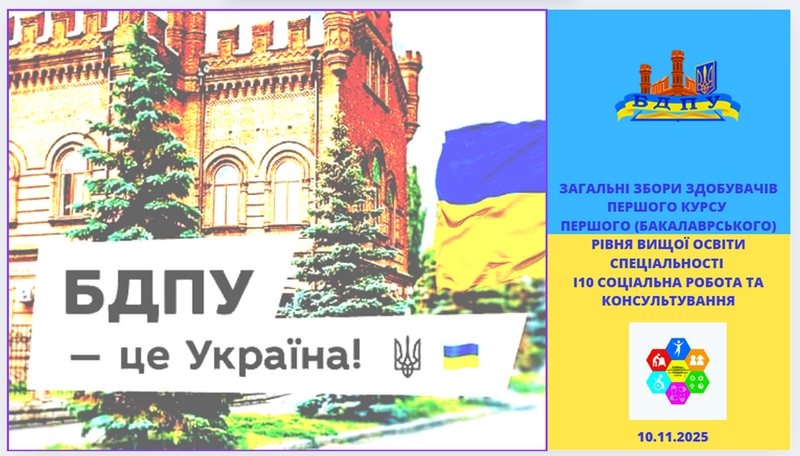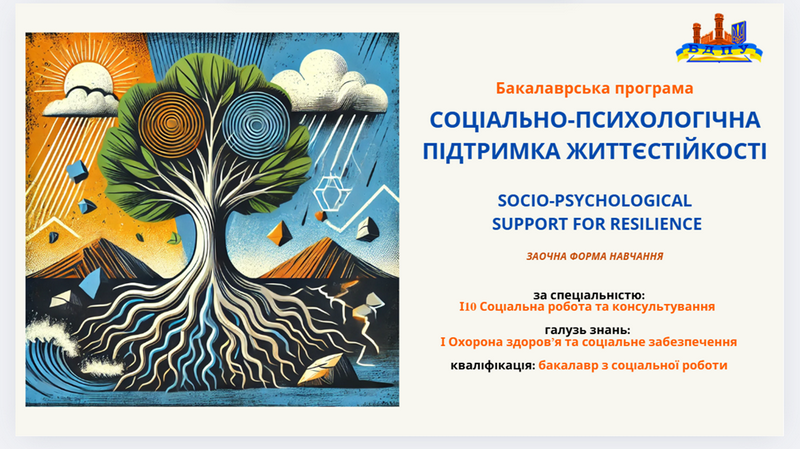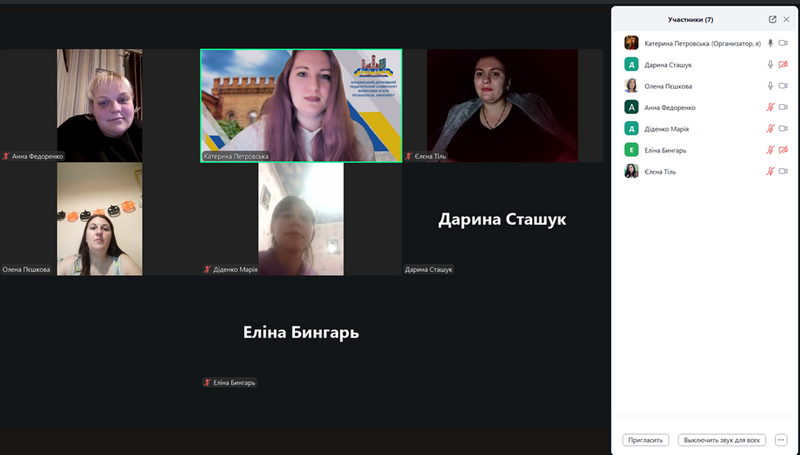10 листопада 2025 року відбулися загальні збори здобувачів першого курсу бакалаврської програми «Соціально-психологічна підтримка життєстійкості» (спеціальність І10 «Соціальна робота та консультування»). Подія стала важливим стартом знайомства першокурсників із командою кафедри, цілями програми та практично-орієнтованими можливостями, які чекають на студентів упродовж навчання.
Гарантка програми, завідувачка, доцентка кафедри соціальної роботи та інклюзивної освіти Катерина Петровська, представила структуру програми, ключові компетентності й практичні завдання, на які спрямована підготовка: робота з кризовими станами, розвиток життєстійкості (resilience), кризове консультування та медіація. Було наголошено, що програма поєднує соціально-педагогічний, психологічний і практичний компоненти, готуючи фахівців для роботи в освіті, закладах соціального захисту, реабілітаційних центрах і громадських організаціях. Вона також коротко провела екскурс в історію кафедри – від створення кафедри соціальної педагогіки до її трансформації у кафедру соціальної роботи та інклюзивної освіти. Присутні також познайомилися з викладацьким складом кафедри, який забезпечує освітній процес за програмою. Така презентація допомогла здобувачам освіти побачити, хто саме супроводжуватиме їхню академічну та практичну підготовку.
На заході окремо було підкреслено, що практичне навчання починається вже з першого курсу – це одна з конкурентних переваг програми. Студентам запропоновано гнучкі індивідуальні освітні траєкторії, можливості академічної мобільності, участь у соціальних проєктах і волонтерстві. Також було роз’яснено процедуру перезарахування результатів неформальної освіти, що відкриває додаткові шляхи для визнання компетентностей, набутих поза аудиторією. Гаранткою було акцентовано увагу на завданнях підготовки за цією ОП: розвиток навичок роботи з людьми, які пережили травматичні події; застосування методик розвитку життєстійкості у дітей, молоді, сім’ях та громадах; формування навичок кризового консультування і супроводу у складних життєвих обставинах. Окремо відзначено міждисциплінарність програми, ціннісно-орієнтований підхід та широкий вибір професій, який відкривається для випускників. Освітньо-професійна програма «Соціально-психологічна підтримка життєстійкості» орієнтує майбутніх фахівців не лише на професійні знання, а й на розвиток емпатії, цінностей та відповідальності перед громадою. Такий баланс теорії й практики – необхідна відповідь на сучасні соціальні виклики, зокрема на потреби постраждалих від травматичних подій, вимушених переселенців та сімей у стресових обставинах.
На завершення зустрічі гарантка програми окреслила практичні поради для першокурсників: активно залучатися до практичних занять і волонтерських ініціатив, використовувати можливості для академічної мобільності, планувати індивідуальну траєкторію навчання з урахуванням власних інтересів і професійних цілей.
Ця зустріч стала важливим орієнтиром для першокурсників: відчуття підтримки кафедри, чітке бачення навчальної траєкторії й конкретні кроки для вбудування практики у навчальний процес дають підґрунтя для успішного професійного становлення.



За матеріалами кафедри соціальної роботи та інклюзивної освіти
Inspiring dialogue: meeting of first-year students and guarantors of the educational program “Socio-psychological support of resilience”

On November 10, 2025, a general meeting of first-year students of the bachelor’s program “Socio-psychological support of resilience” (specialty I10 “Social work and counseling”) was held. The event was an important start for first-year students to get to know the department team, the goals of the program, and the practically-oriented opportunities that await students during their studies.
The guarantor of the program, head, associate professor of the Department of Social Work and Inclusive Education, presented the structure of the program, key competencies and practical tasks that the training is aimed at: working with crisis situations, developing resilience, crisis counseling and mediation. It was emphasized that the program combines socio-pedagogical, psychological, and practical components, preparing specialists to work in education, social protection institutions, rehabilitation centers, and public organizations. She also briefly gave a tour of the history of the department – from the creation of the Department of Social Pedagogy to its transformation into the Department of Social Work and Inclusive Education. The attendees also got acquainted with the teaching staff of the department, which provides the educational process according to the program. This presentation helped students see who exactly would be supporting their academic and practical training.
At the event, it was specifically emphasized that practical training begins in the first year – this is one of the competitive advantages of the program. Students were offered flexible individual educational trajectories, opportunities for academic mobility, participation in social projects and volunteering. The procedure for re-enrolling non-formal education results was also clarified, which opens up additional avenues for recognizing competencies acquired outside the classroom. The guarantor focused on the tasks of training under this OP: developing skills in working with people who have experienced traumatic events; applying methods for developing resilience in children, youth, families, and communities; developing skills in crisis counseling and support in difficult life circumstances. The interdisciplinary nature of the program, the value-oriented approach, and the wide choice of professions open to graduates were particularly noted. The educational and professional program “Socio-psychological support of resilience” orients future specialists not only on professional knowledge, but also on the development of empathy, values, and responsibility to the community. Such a balance of theory and practice is a necessary response to modern social challenges, including the needs of victims of traumatic events, internally displaced persons, and families in stressful circumstances.
At the end of the meeting, the program guarantor outlined practical advice for first-year students: actively engage in practical classes and volunteer initiatives, use opportunities for academic mobility, and plan an individual learning trajectory taking into account your own interests and professional goals.
This meeting became an important reference point for the first-year students: a sense of support from the department, a clear vision of the educational trajectory, and specific steps for integrating practice into the educational process provide the foundation for successful professional development.



Based on materials from the Department of Social Work and Inclusive Education
